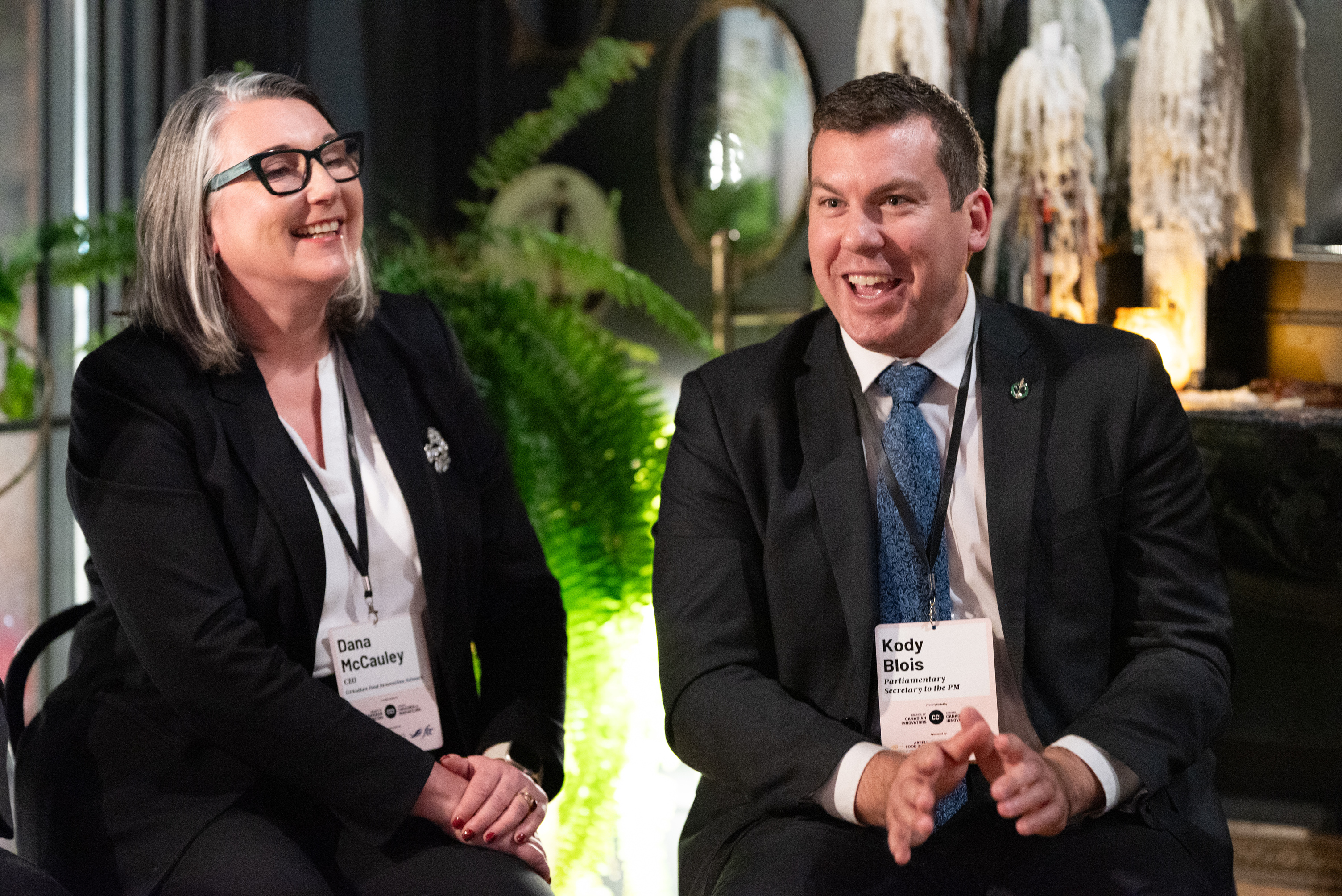.png)
Seen & Heard: Mooseworks Live – Farms, Food and Canada's Sovereignty
November 20, 2025
Canada has everything it takes to be the world's leading food superpower. We have the land, the water, and the talent to meet growing global demand. But are we making the most of our advantages?
On November 18, the Council of Canadian Innovators brought together CEOs, policy leaders, and government stakeholders in Ottawa to talk about how Canada can build a more sovereign, prosperous food economy. The conversation focused on how governments, innovators, farmers, and food producers can work together to become a value-add export leader across the entire farm-to-food value chain.
Here's what we heard from leaders working to position Canada as a global food powerhouse:

Building Sovereignty Through Innovation
Laurent Carbonneau, CCI's Director of Policy and Research, opened the discussion by framing the challenge facing Canada's agri-food sector:
"Canada is uniquely positioned to feed the world, but we're not capitalizing on our competitive advantages the way we should. We export commodities when we should be exporting value. We have world-class research institutions, innovative food companies, and productive farmers, but our policy framework hasn't caught up to the opportunity in front of us. Building food sovereignty isn't just about production; it's about owning more of the value chain, protecting our intellectual property, and ensuring Canadian innovation translates into Canadian economic growth."

From Commodities to Value Creation
The Mooseworks Live panel brought together experts from across the food ecosystem to explore how Canada can move up the value chain.
Dana McCauley, CEO of the Canadian Food Innovation Network, has spent her career driving food innovation in Canada. She emphasized the need to support entrepreneurs who are creating value-added products:
"We have incredible food innovators in Canada developing products that compete in big markets like the US and on the world stage. But too often, they hit barriers—whether it's access to capital, regulatory complexity, or a lack of infrastructure to scale. If we want to be a food superpower, we need to make it easier for Canadian food companies to grow here and export from here. We need to shift the balance to export more products and technologies and fewer ideas and start ups, especially as Canada’s natural fundamentals give us both so much potential and so much for other countries to target."

Evan Fraser, Director of the Arrell Food Institute at the University of Guelph, brought a systems-level perspective on food security and sustainability, highlighting Canada's potential to lead globally:
"Climate change is reshaping where food can be grown and how it's produced. Canada is actually in an advantageous position—we have the resources, the technology, and the research capacity to be a leader in sustainable food production. But we need policy that supports innovation at every stage, from the farm to the processing facility to the marketplace. The world needs what Canada can produce, but we need to think strategically about how we build long-term competitiveness, not just short-term exports."

Darren Anderson, Co-Founder and CEO of Vive Crop Protection, spoke to the role of agricultural technology in driving productivity and sustainability:
"Canadian farmers are among the most efficient and innovative in the world, but they need access to cutting-edge tools and technologies to stay competitive. At Vive, we're using nanotechnology to make crop protection more effective and more sustainable—but scaling that kind of innovation requires a policy environment that encourages R&D investment and rewards companies that commercialize in Canada. If we want to build sovereignty in agriculture, we need to support the companies developing the technologies that will define the future of farming."

Kody Blois, Parliamentary Secretary to the Prime Minister, acknowledged the government's role in creating the conditions for growth:
“We have a very positive story to tell, but we need to challenge ourselves not to become complacent. If we don’t have Canadian-based companies scaling here, decisions will be made outside our borders. We need to build an investment climate where Canadian businesses can succeed and grow. In our platform, we have introduced measures that will strengthen the competitiveness of Canadian businesses and support the long-term vitality of our agriculture sector.”

A Call to Action
The panel underscored a central theme: Canada's path to food sovereignty runs through innovation, collaboration, and policy reform. With the right investments and the right framework, Canada can do more than feed the world—it can lead it.
This policy discussion on how Canada can build a more sovereign and prosperous food economy was made possible thanks to the commitment of our partners.
Special thanks to the Arrell Food Institute and Farm Credit Canada for their leadership and support in advancing this important conversation.
Sign up for CCI’s Newsletter to receive more updates on our advocacy work, and timely policy conversations about Canada’s economic future.
About the Council of Canadian Innovators
The Council of Canadian Innovators (CCI) represents more than 175 of Canada’s fastest-growing technology companies. Founded in 2015, CCI advocates for policies that help Canadian innovators scale globally, create prosperity at home, and strengthen Canada’s economic sovereignty.
JOIN CCI'S NEWSLETTER
